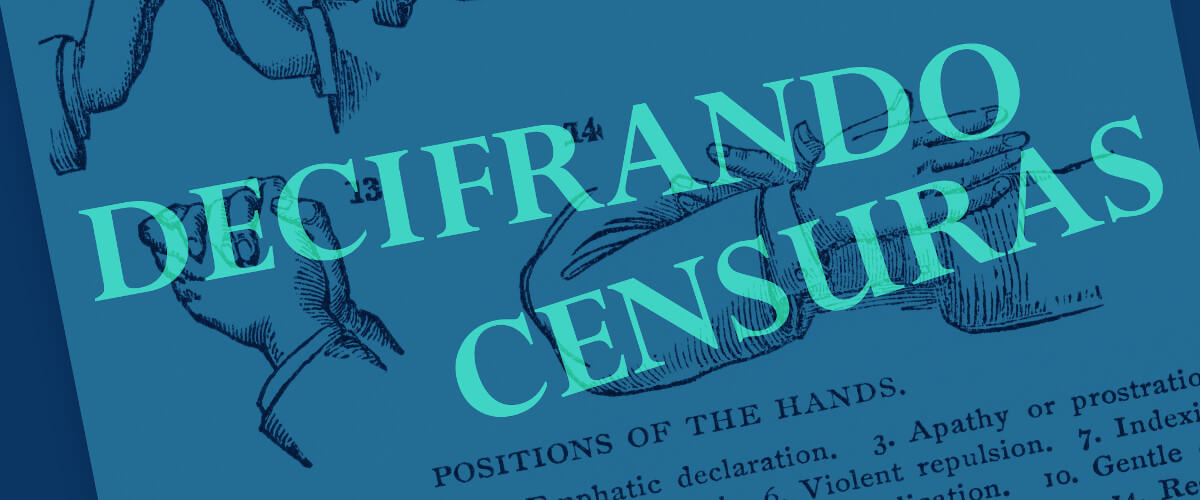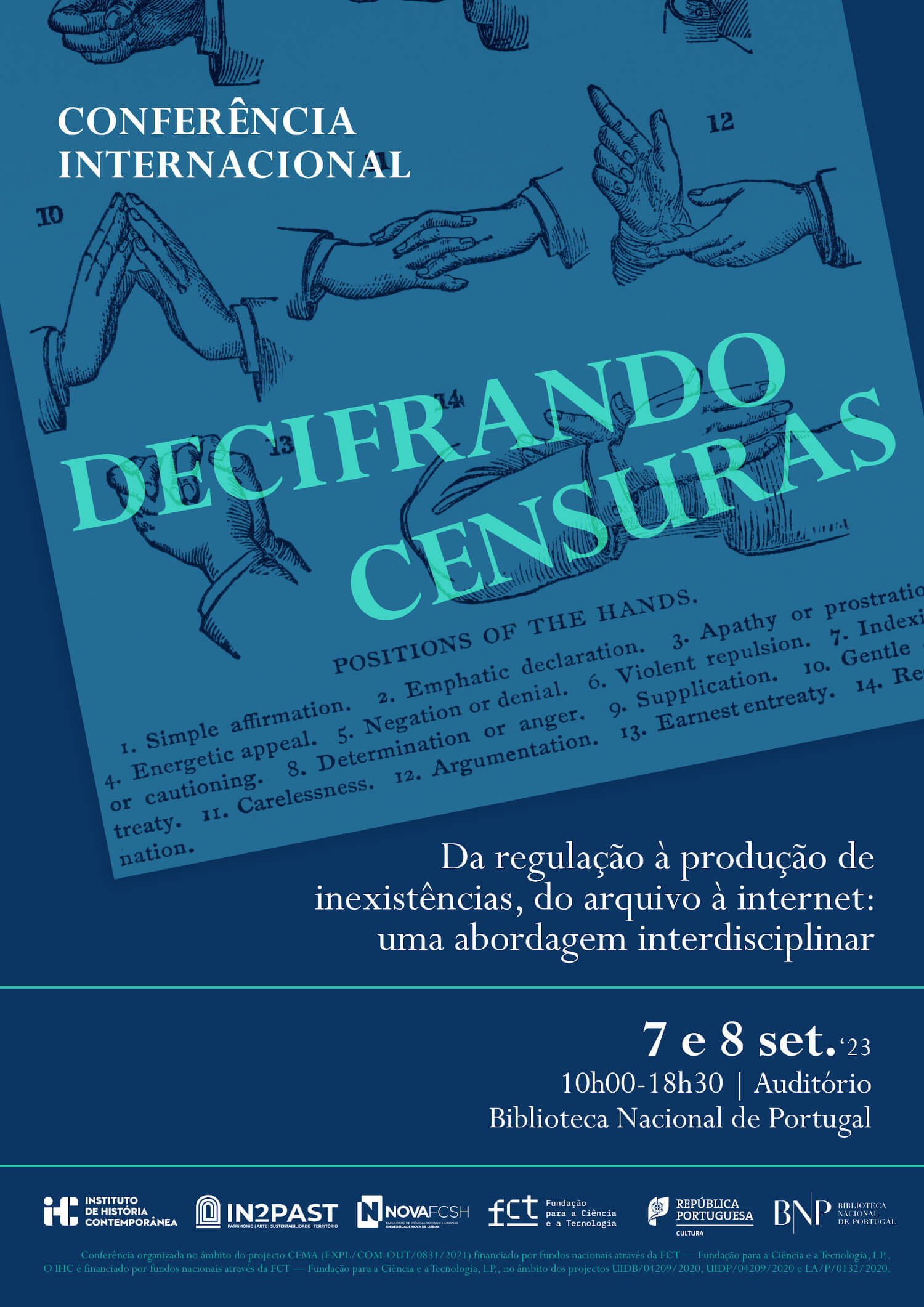setembro, 2023

Detalhes do Evento
International conference that seeks to foster a global/international approach to studying censorship. Deciphering Censorship From regulation to the production of invisibilities, from the archive to the Internet:
Ver mais
Detalhes do Evento
International conference that seeks to foster a global/international approach to studying censorship.
Deciphering Censorship
From regulation to the production of invisibilities, from the archive to the Internet:
an interdisciplinary approach
According to search trends on Google, the Portuguese/Spanish word “censura” and “censorship” portray the importance of their correlation with social media platforms, in English (YouTube, Twitter, Facebook, etc.) and famous young women in Latin languages (Miley Cyrus, Megan Fox, Emma Watson and Lindsay Lohan are on Top 20 correlated searches, between 2004-2022). These two major themes, the economy and moral norms, show how censorship remains a question to be dealt in the present.
Nevertheless, such phenomena are hardly new. These phenomena, both economic and moral in nature, have accompanied the public and private sphere institutional regulation process, ever since, following the invention of the press, intermittent persecution of heretics was replaced by systematic control of printed material. Indeed, historical perspective enables observing censorship methodologies’ reorganisation in step with media technological development: cinema drove the age rating system (Robertson 2005), telegrams and, subsequently, telephone calls entailed flexibility in the controls exercised by institutions and agents of censorship.
Despite censorship depicting a quintessential display of the exercising of power, which is historically wielded by influential subjects, managers of public space, economic processes, and political institutions (Martin 2016), consensus around the meaning of the word censorship has crumbled in recent decades (Müller 2004; Moore 2013; Darnton 2014). This collapse first came to the fore in the context of the ‘Culture Wars’ of the 1980s and 1990s when American liberal academics, anchored in theoretical approaches stemming from the works of Michel Foucault (1978) and Pierre Bourdieu (1991), demonstrated the existence of censorial phenomena within democratic contexts (cf. Burt 1994; Post 1998).
The new approaches to censorship continue to accept that States may exercise direct control (repression) while also beginning to identify censorial dimensions of indirect control that may be deployed (through financing, education, public history, etc.) and, above all, starting to demand direct state intervention in the regulation of private powers exercising constraints on the freedom of expression (Post 1998). This includes the forms of “market censorship” that induce self-censorship (Jansen 1988) or policies of “don’t ask, don’t tell” imposed on gay members of the U.S. Army between 1994-2011, enveloping them in a type of annulment embedded into the structure of societies (Butler 1998). This embedded character of censorship in society has been labelled “constitutive” or “structural” censorship in opposition to that wielded by institutions such as the state or the church, i.e., regulatory censorship. Within this scope, the recent issues surrounding “cancel culture”, the “woke” approaches to culture, and the biases of algorithms demonstrate how this phenomenon is socially structural.
Hence the need to scrutinize such phenomena in order to scientifically distinguish between, on the one hand, censorial processes and, on the other hand, conservative discourses that – faced with the emergence of voices legitimately demanding new spaces for communication -, instrumentally deploy allegations of some claimed censorship to conserve privileges and monopolies. Therefore, we need to differentiate between boycotts and censorship, because they do not emerge from the same places in the power system.
We are aware that participation in a conference that seeks to foster a global/international approach to studying censorship not only has inherent implications for the study of this specific field, but also constitutes a challenge to academia that, by thinking globally, runs into the material limitations imposed by the present moment contingencies of the academic system, with all of its peripheries, and the social and political pressures that shape intellectual production and dissemination.
🔗 Link for MS Teams streaming (Meeting ID: 325 454 320 467; Access code: rKR6ff)
Call for communications
We would invite all parties interested in this theme to participate in the conference across any of the four axes detailed below. Nevertheless, there is an openness to other proposals that set out new paths and, hence, the framework below is in no way exhaustive.
Axis 1 – Analytical models and methodologies
How to approach the interferences of the different codes inherent to censorship? On the one hand, the society idealised by the institution, the one hypothetically resulting from strict compliance with the regulatory norms and, on the other hand, the actually existing society, with its references, prohibitions, plural resistances and creativity in answer to the invisibility of censorship? We are especially interested in models that explore the diversity of actors, contexts, and implications of censorship in interpersonal relationships (family, intimate, labour and social interactions).
Axis 2 – Framework for the factor of international circulation
The introduction of the circulation variable enables a questioning of national boundaries in the study of censorship. This axis prioritises those approaches that focus on the transnational and comparative aspects, whether introducing the notion of flow or focusing on the circulation of censorship, the censored and their forms of resistance.
Axis 3 – Meta-analysis
With censorship constituting a dimension that challenges the interpretative capacities of different actors, it would be remiss of researchers not to question their own respective subjectivity and capacity for analysis. What role does interpretative error occupy in the studies on censorship? How to navigate among the intentions of actors, producers, the censor’s interpretative skills, and the diverse subsequent interpretative layers?
Axis 4 – Implications of censorship
Censorial practices represent a point of entry into the analysis of power, culture, and political, religious, and artistic constructions. We seek to introduce this variable into the production of political, economic, social and cultural history.
Keynote speakers:
Nicole Moore, University of New South Wales (UNSW), Canberra, Australia
Nicole Moore is Professor in English and Media Studies at UNSW Canberra. From September 2022 to July 2023, she is the Visiting Professor of Australian Studies in the Centre for American and Pacific Studies at the University of Tokyo. Her main research interest is Australian literature, combined with interdisciplinary and comparative research in cultural history, gender and sexuality studies, and book history, with a special interest in censorship. Her 2012 book The Censor’s Library: Uncovering the Lost History of Australia’s Banned Books won the Walter McCrae Russell award from the Association for the Study of Australian Literature. Recent Edited collections pursue the topics of global literary censorship or Australian Literature in the German Democratic Republic. Her research pursues issues at stake in the political cultures of writing and reading, and the complex relations of literature, governance and history within and across national boundaries. Prof. Moore has held visiting fellowships at the Menzies Centre, Kings College London; the Faculty of English, University of Cambridge; the National Archives of Australia, and the Humanities Research Centre, Australian National University. From 2018 to 2022, she was Associate Dean for UNSW Canberra’s Special Collections, fostering research, curation and partnerships utilising the rich manuscript materials and rare books in UNSW Canberra’s world class collections.
Robert Darnton, Carl H. Pforzheimer University Professor (Emeritus), Harvard University, USA
Robert Darnton was educated at Harvard University (A.B., 1960) and Oxford University (B.Phil., 1962; D. Phil., 1964), where he was a Rhodes scholar. After a brief stint as a reporter for The New York Times, he became a junior fellow in the Society of Fellows at Harvard. He taught at Princeton from 1968 until 2007, when he became Carl H. Pforzheimer University Professor and Director of the University Library at Harvard. He has been a visiting professor or fellow at many universities and institutes for advanced study, and his outside activities include service as a trustee of the New York Public Library and the Oxford University Press (USA) and terms as president of the American Historical Association and the International Society of Eighteenth-Century Studies. Among his honors are a MacArthur Prize Fellowship, a National Book Critics Circle Award, election to the French Legion of Honor, the National Humanities Medal conferred by President Obama in February 2012, and the Del Duca World Prize in the Humanities awarded by the Institut de France in 2013. He has written and edited many books, including The Business of Enlightenment: A Publishing History of the Encyclopédie (1979), The Great Cat Massacre and Other Episodes in French Cultural History (1984), Berlin Journal, 1989- 1990 (1991), The Forbidden Best-Sellers of Prerevolutionary France (1995) and Censors At Work. How States Shaped Literature (2014).
Richard Burt, University of Florida, USA
Richard Burt is Professor of English at the University of Florida. He held a Fulbright scholarship in Berlin, Germany from 1995–96, and taught there at the Free University and the Humboldt University. He is currently writing a book entitled “See Also: A Literary History of the Cross-Reference”. Burt has published on a wide variety of topics, including censorship. Burt is the author of “Licensed By Authority: Ben Jonson and the Discourses of Censorship” (1993) and the editor of “The Administration of Aesthetics: Censorship, Political Criticism, and the Public Sphere” (1994). This collection which includes an introduction by Burt entitled “The New Censorship” and a chapter by Burt on a 1991 L.A. museum reconstruction of a Nazi exhibition on “Degenerate Art” in 1937. A chapter on censorship appeared in Robert Post’s collection, “Censorship and Silencing: Practices of Cultural Regulation” (1998) and with Jeffrey Wallen co-authored wrote an essay on campus speech code entitled “Knowing Better: Sex, Cultural Criticism, and the Pedagogical Imperative in the 1990s,” that appeared in Diacritics 1999. Burt published an article on passports with chips, two Alain Resnais films, and essays by Adorno and Benjamin on book destruction in “Shelf-Life: Biopolitics, the New Media Archive, and ‘Paperless’ Persons” (New Formations, 2012).
Submission of proposals
Proposals should be no longer than 400 words, include a title and be accompanied by a short biography (max. of 100 words). The working languages are Portuguese, Spanish, French and English. E-mail for submissions: decifrandocensuras@fcsh.unl.pt
Submission deadline: 30 April 2023
Organising Committee
Adalberto Fernandes (IHC — NOVA FCSH / IN2PAST)
Andru Chiorean (National University of Political Science and Public Administration, Roménia)
Daniel Melo (CHAM — NOVA FCSH)
Mélanie Toulhoat (IHC — NOVA FCSH / IN2PAST)
Rita Luís (IHC — NOVA FCSH / IN2PAST)
Rui Lopes (IHC — NOVA FCSH / IN2PAST)
References
Bourdieu, Pierre (1991). Language and Symbolic power. Cambridge: Polity Press.
Burt, Richard (ed.) (1994). The Administration of Aesthetics: Censorship, Political Criticism and the Public Sphere, Minnesota: University of Minnesota Press.
Butler, Judith (1998). “Ruled out: vocabularies of the censor”. In: R. Post (ed.), Censorship and silencing: practices of cultural regulation, (247-259) LA: Getty research institute for the history of art.
Darnton, Robert (2014). Censors at Work. How states shaped Literature. NY: WW Norton.
Foucault, Michel (1978). The History of Sexuality: An Introduction. New York: Pantheon Books.
Jansen, Sue. (1988). Censorship: The Knot that Binds Power and Knowledge, New York: Oxford University Press.
Moore, Nicole (2013). “Censorship Is”. Australian Humanities Review, 54:45–65.
Müller, Beate (ed.) (2004). Censorship and Cultural regulation in Modern Age, Amesterdam/NY: Brill/Rodopi.
Martin, Laurent (ed.) (2016). Les Censures dans le Monde. XIXe-XXIe siècle. Rennes: Presses Universitaires de Rennes.
Post, Robert (ed.) (1998). Censorship and Silencing: Practices of Cultural Regulation. LA: Getty research institute for the history of Art and the Humanities.
Robertson, Jim (2005). The Hidden Cinema British film censorship in action, 1913–1975 (e-library). Routledge.
Conference organised as part of the research project CEMA – Censorship(s):an analytic model of censorial processes (EXPL/COM-OUT/0831/2021) funded by National funds through FCT — Fundação para a Ciência e a Tecnologia, I.P.
Tempo
7 (Quinta-feira) 9:30 am - 8 (Sexta-feira) 5:30 pm
Organizador
Institute of Contemporary History — NOVA School of Social Sciences and Humanitiescomunicacao.ihc@fcsh.unl.pt Avenida de Berna, 26C - 1069-061 Lisbon

